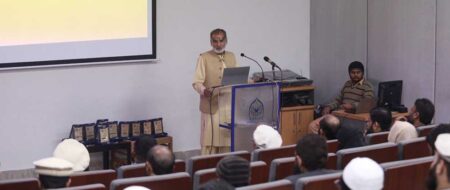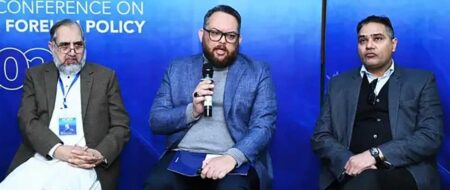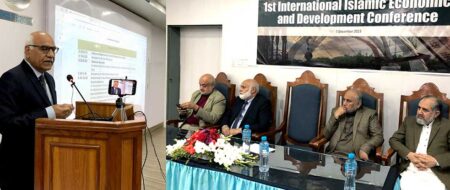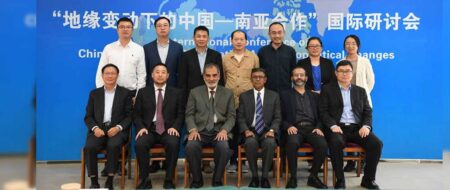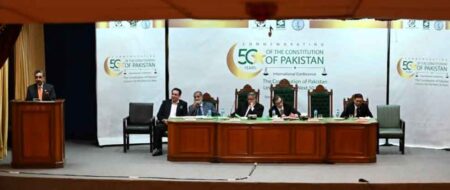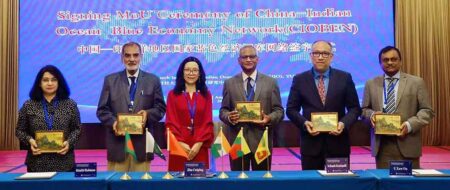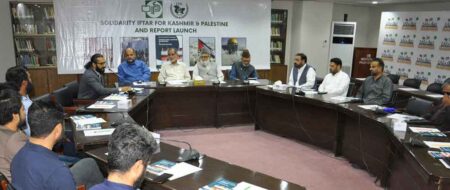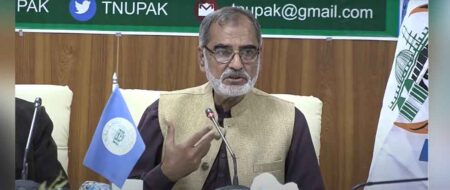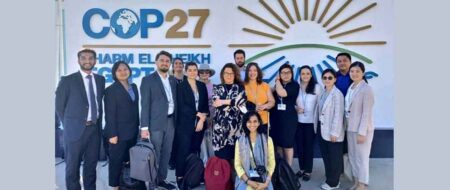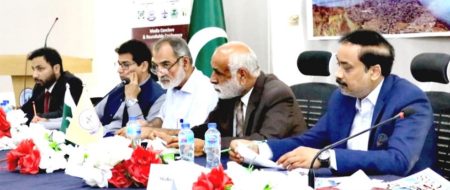Highlights of the Global Economic Challenges and Islam Series of Lectures
Economic Globalization and Islam: Are They Compatible? – Dr. Chapra explained that economic progress and integration could not be achieved without social and political integration. Islam is a religion of peace and harmony that calls for tolerance of others’ values, and as such, is compatible with economic globalization. However, social integration was threatened by anti-Islam and anti-Muslim sentiments. The United Nations had failed to create political integration and was seen as biased. Moreover, the efforts under way for economic integration were biased in favor of the developed countries: far from giving special concessions to developing countries, the developed countries continued to demand lower tariffs without curtailing subsidies to their own agriculture sector – an area where the developing world had some scope of gains from globalization.
Chairing the occasion, the head of the EU delegation in Islamabad, His Excellency Ilka Uusitalu said that Islam gives splendid principles for peaceful coexistence. He explained that the EU deeply respects cultural diversity. As the largest trade partner and open market for developing countries, EU is constantly reviewing its policies and is currently changing its position on subsidies in agriculture. He agreed that there were clear weaknesses in WTO and UN but “we do not have a better alternative. So we try to strengthen these institutions and remove the flaws…this requires political will and flexibility as well as will to compromise.”
Meeting the Global Challenge: The Role of Islamic Economics – Dr. Chapra was of the opinion that the role of Islamic economics, in a nutshell, is to “inject the moral dimension” that contemporary economics lacks, and the absence of which threatens to cause economic as well as social collapse. Dr. Chapra explained that living beyond means – a trend promoted by conventional economics – causes inflation and indebtedness at the individual as well as state level, and raises costs for the least privileged, deepening economic inequities. While self-interest, market mechanism, production and consumption were important elements of an economic system, they could not lead to balanced and equitable growth without the tempering and guiding influence of principles such as those offered in Islam to bring economic activity in harmony with other spheres of life. Referring to current global challenges, he observed that there was a greater need for different economic systems to come closer, and that the world could learn from Confucian philosophy and the Japanese experience as well as from the Western model and Islam.
Chairing the occasion, the Japanese Ambassador, His Excellency Nobuaki Tanaka, agreed that the world could greatly benefit from the teachings of Islam and the works of Muslim economists. Discussing Japan’s economic success, he cited developed financial institutions, high saving rates, rapid developments in industry and technology, work ethics and very low corruption as key factors. Mr. Tanaka noted that globalization had always been under way but was more manifest in today’s world, making it imperative for countries to respect and learn from one another’s values and systems.
Socioeconomic Justice and the Muslim World – Dr. Chapra candidly discussed the stark contrast between the socioeconomic and political environment envisaged in Islam and the current “miserable situation” of the Muslim world. He said Islam envisions comprehensive development: “It ensures reward for merit and hard work, low crime rate, functioning democracy, honest and efficient judiciary and good governance.” Citing international evaluations, he dwelt on the low levels of education and economic development, high corruption, and rampant socio-political ills in Muslim countries. Discussing the way out, he spoke at length about the social theories of Ibn Khaldun and also mentioned the Prophet Mohammad’s (SAW) peaceful approach towards reform. History showed that violent upheavals usually ended in short-lived changes. Dr. Chapra added that the West could help bring democracy to the Muslim world by curtailing its support for dictators in Muslim countries.
In his concluding remarks, the event’s chairman, Mr. Agha Shahi, stressed the need to understand the teachings of Islam, focus on finding solutions to contemporary problems, and strive to “live by them in true spirit.”
International Financial Stability: Can Islamic Finance make a Positive Contribution? – Dr. Chapra explained that international financial crises being witnessed in different parts of the world were due to built-in flaws in the capitalist economic system, which encourages living beyond means on easily available credit. He warned that leading Western economists feared a possible economic breakdown on account of excessive credit expansion, rash liberalization of the financial market, and lack of supervision over the financial market. “Living beyond means,” Dr. Chapra pointed out, is intrinsically harmful to society in many ways and leads to deeper socioeconomic inequality. Islam's stress on equity rather than debt was at clear variance with conventional economics and offered a far more stable alternative. Moreover, “Islam curbs living beyond means, stresses on simple living and prescribes zakat on the wealthy for judicious circulation of wealth in society.”
The chairman of the session, Belgian envoy His Excellency Patrick Renault, agreed that the large and increasing difference between actual trade and the volume depicted in transactions was “frightening.” Mentioning the EU’s efforts to address weaknesses in the existing financial system he said, “We can learn much from the expertise of Muslim economists as well as the experiments in the field of Islamic economics.” The Ambassador also said that “There is no opting out” from globalization, which meant systemic problems needed to be removed and countries had to acquire mutual understanding and respect through meaningful dialogues on challenging issues, such as the current lecture series organized by IPS.


